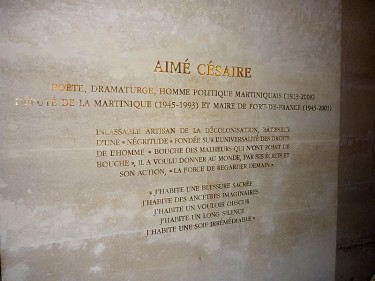[All links forward to French-language webpages unless otherwise noted]
The famed poet and activist from Martinique Aimé Césaire [en] would have been 100 years old on June 26, 2013. Césaire's birthday is an opportunity to pay tribute to the champion of the anti-colonial African identity Négritude movement: a movement that is currently being shaped by a more globalized world where people come together across borders and continents, all the while attempting to protect and foster their own cultural identities.
It is as if his vision of the world back in the 1930's along with those who fought for respect for cultural differences has become yet again a tangible reality 80 years later. Today, almost every country in the world fights a battle against racism with relative success. Still, injustices remain, the verdict in the trial for the death of Trayvon Martin can attest to this [en].
Today, human dignity is attacked in more subtle ways, such as economic hardship and profiling, highlighting the need to revisit the work of activists in the past to fight human oppression. With respect to the fight of activists, writer, French resistance member and Occupy inspiration Stéphane Hessel's successful call for outrage came to fruition to a certain extent with the Arab revolts and the protests in Brazil and in Europe.
Here is a retrospective on the life of Aimé Césaire by Yao Assogba, a sociology professor at the University of Quebec :
Né à la Martinique le 26 juin 1913, Aimé Césaire, poète et homme politique, est mort en sa terre natale, le 16 avril 2008, à l’âge vénérable de 94 ans. La poésie de Césaire est un grand cri de révolte contre la domination coloniale. Son œuvre, à la fois littéraire et sociologique, est une arme de combat contre la « chosification » des peuples noirs par la colonisation européenne. C’est un phare pour la décolonisation de l’Afrique et la réhabilitation des cultures négro-africaines. Pour bien apprécier l’influence déterminante qu’Aimé Césaire, chantre du mouvement de la « négritude », a eue sur la décolonisation et la renaissance de l’Afrique et des Antilles après la Deuxième Guerre mondiale, il faut se replacer dans la situation coloniale de l’époque.
Born in Martinique on the 26 of June, 1913, Aimé Césaire, poet and politician died in his birthplace on the 16 of April 2008 at 94 years old. Césaire's poetry is a great cry of revolt against colonial domination. His work, both literary and sociological is a weapon of warfare against the reification of black peoples by European colonization. It is a siren call for the decolonization of Africa and the rehabilitation of black African cultures. To truly appreciate the important influence that Aimé Césaire, champion of the “negritude” movement had on decolonization, and the renaissance of Africa and the West Indies after the Second World War, one must put oneself in the mindset of the colonial times.
Noel Kodia added on the panafrican news website Le Pangolin Afrik :
Après avoir découvert les lettres en Martinique au lycée de Fort de France et à Louis-le-Grand à Paris, il fonde avec Léopold Sédar Senghor et Léon-Gontran Damas en 1939 “L’Etudiant noir” qui se présente comme une suite logique d’une autre revue de l’époque intitulée “Légitime défense”. A la même année apparaît son “Cahier d’un retour au pays natal” comme pour annoncer son retour au bercail dans une langue volcanique et pleine d’agressivité et qui va s’approfondir avec une colère légitime dans “Discours sur le colonialisme”. Le texte met en relief l’itinéraire du poète nègre devant son destin de colonisé dont la thématique sera le nerf directeur de l’emblématique “Discours sur le colonialisme”. Dans ce cri de douleur, il ne se voit pas fils de certains royaumes africains comme le Dahomey et le Ghana.
After discovering literature in Martinique at the Lycée de Fort de France and at Louis-le-Grand in Paris, he founded, along with Léopold Sédar Senghor and Léon-Gontran Damas in 1939 “L’Etudiant noir” [The Black Student] that positioned itself as a follow up to another journal of the time, “Légitime défense” [Self-Defense]. In the same year “Cahier d’un retour au pays natal” [Notes on a return to the motherland] appeared, as if to announce a return to the cradle with an explosive and aggressive language that eventually came to a crescendo in “Discours sur le colonialisme” [Discourse on Colonialism]. The text throws into relief the journey of the black poet, facing his fate as a colonized person. The raw nerve of the iconic “Discours sur le colonialisme”. In this crying out of pain, he doesn't see himself as the son of certain African kingdoms such as Dahome and Ghana.
Aimé Césaire and the fight for human dignity
Nicole on médiapart wrote about the challenges that Césaire had to face during his life:
Les écrits d’Aimé Césaire ne lui ont pas attiré les sympathies de l’Académie française qui, globalement, est de cette droite revancharde forte de ses certitudes et qui ne renie pas la conception de la civilisation qu’elle a infligée aux colonies, et qu’Aimé Césaire n’a cessé de dénoncer avec élégance et pertinence. «…La France moutonnière aura préféré Senghor et ses mots fleuris, sa poésie de garçon-coiffeur, ses «versets», sa sotte imitation, pâlotte et ringarde, de Claudel, ses génuflexions d’acculturés et son culte imbécile d’une toute aussi imbécile civilisation de l’universelle et d’une bâtarde francophonie; au style de pur-sang, de révolté, d’écorché vif d’un Alioune Diop, d’un Gontran-Damas, d’un Césaire…Aimé Césaire restera la mauvaise conscience de ce XXe siècle, de ces générations qui donnèrent au monde le contraire de ce qu’elles espéraient. Il aura été de toutes les luttes progressistes de son temps.
Il aura écrit, avec son Discours sur le colonialisme, le livre le plus concis, le plus fort sur ce thème. Il aura bâti la réfutation la plus solide de ce système. Il aura été un écrivain supérieurement doué, un humaniste sincère, généreux. (…) Césaire fut une leçon d’honnêteté, une leçon d’amour de la langue française, un maître en écriture, un traceur de route, une école de style -lui, si parfait pur-sang littéraire- un repère».
Aimé Césaire's writings did not attract the support of the Académie Française– that self-consciously and self-confidently opposing right that refuses to revoke the idea of civilization that it foisted upon the colonies, which Aimé Césaire never ceased to denounce eloquently and precisely. “…sheepheaded France would have preferred Senghor, his affected, flowery language, his verses, his mindless imitation of Claudel, wan and ossified; his conformist kowtowing and his stupid worship of another, equally stupid civilization of the universal whole, and of a half-breed Francophone. In the manner of purebred, rebel, torn from the flesh of an Alioune Diop, a Gontran-Damas, a Césaire…Aimé Césaire would remain the thorn in the side of the 20th Century — of those generations that would give the world the exact opposite of what was expected. He would become a part of all the progressive movements of his time. He would write, with his “Discours sur le colonialisme” the most accurate and strongest book on this subject. He would fight against the strongest rebuttals of this system. He would be a more gifted writer, a sincere and generous humanist…Cesaire was a study in honesty, in love for the French language, a master in writing, a GPS, his own school of thought; he, so perfect, a real true literary thoroughbred — a landmark.
Here is a video of his speech on colonialism read by Thymslab:
To put Césaire's impact into a contemporary perspective, it is worth having the input of a contemporary writer such as Alain Mabanckou, Prix Renaudot 2006, who was interviewed by Grégoire Leménager on the blog le Pangolin:
Alain perpétue en quelque sorte le travail des pionniers dans une démarche autocritique relativement objective et un style humoristique captivant. Il s’attaque aux stéréotypes passés et présents en montrant les différentes conditions de l’homme noir selon son lieu de résidence. Le noir d’Amérique semblerait avoir mieux réussi à vivre sa citoyenneté en Amérique qu’en France et les africains de l’ouest différent de ceux du centre dans leurs perceptions de leur histoire et de leur présence actuelle au monde.
Alain carries on in some way the work of pioneers on a path of objective self-examination and a captivating humorous style. He attacks stereotypes of the past and present by showing different conditions of the black man depending on where he lives. The black of America would seem to have better succeeded in staking his claim as a citizen than in France, and West Africans are different from Central Africans in their views of their history and their modern day presence in the world.









1 comment